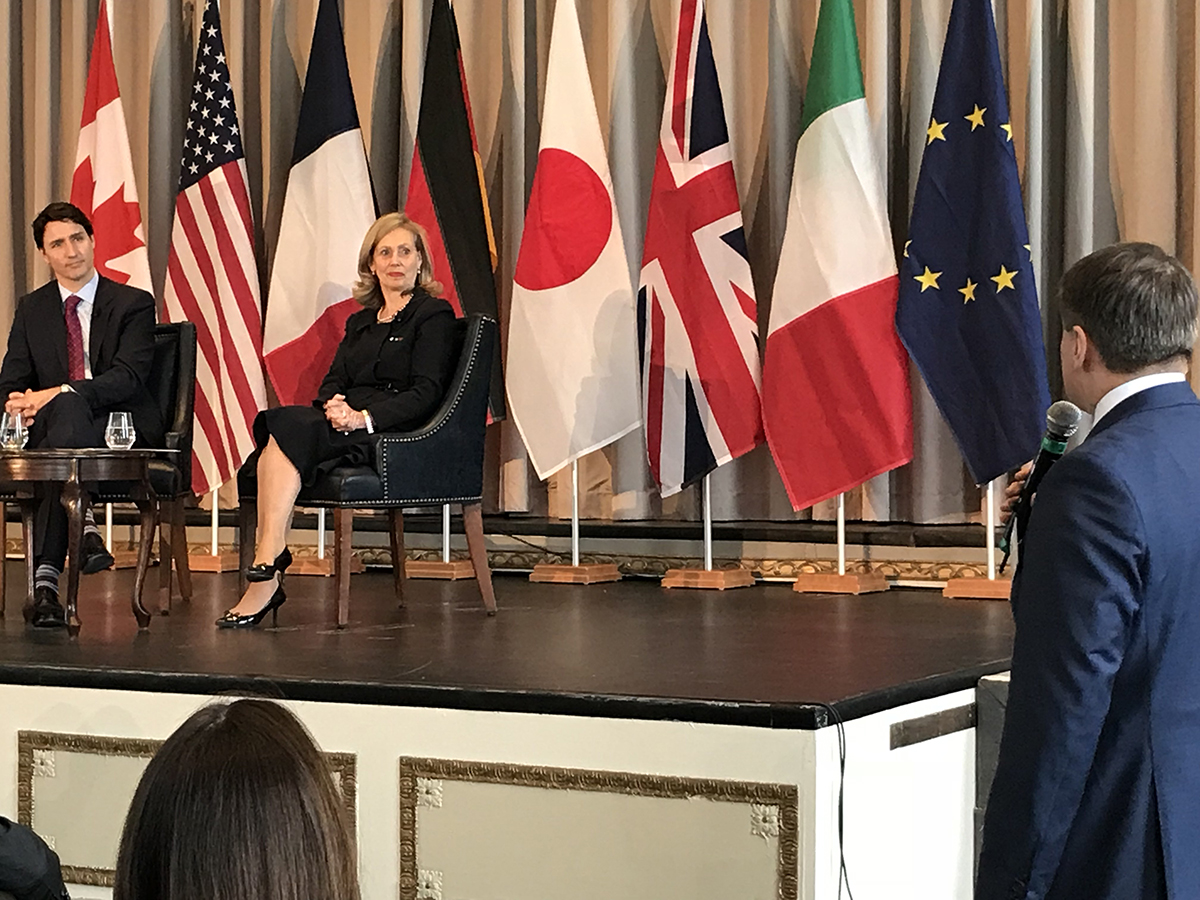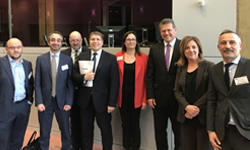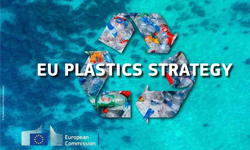BusinessEurope Headlines No. 2018-13
B7 Summit - addressing global challenges with business-oriented solutions

The business leaders of the G7 economies met in Quebec City, Canada, from 4 to 6 April to discuss the main challenges our societies have been confronted with, including inclusive growth, resource efficiency and scaling up of SMEs. They presented a joint statement at the end of the summit, in a press conference together with Canadian Minister of International Trade François-Philippe Champagne. Although not formally part of the agenda, Trade was at the center of the discussions, with business expressing strong concerns about the possibility of facing a “trade war”. In his remarks, BusinessEurope Director General Markus J. Beyrer stated that “free and fair trade are the most powerful engines for growth, supporting millions of jobs, fostering innovation and contributing to prosperity. Our societies can only function if everyone plays by the same rules, respecting the multilateral trading system and the WTO”. This message was conveyed to the Canadian Prime Minister Justin Trudeau, who praised the role of European business in making the EU-Canada Comprehensive Economic and Trade Agreement (CETA) a reality, ensuring a high level of ambition and setting a benchmark for future trade agreements.
![]() Contact: Luisa Santos
Contact: Luisa Santos
Our comment
National security shouldn’t be an excuse for protectionism
By Luisa Santos, Director for International Relations
 Companies need stability and predictability to plan ahead their investments and business strategies. Unfortunately, these days business scenarios can change at the speed of a tweet. An international trade order that took decades to be created is now being undermined by unilateral actions. Protectionism is on the rise, on the basis of concepts that were not used in the past, like national security. It is not easy to judge what constitutes a risk for the national security of a given country. However, this should not be an excuse to limit imports or address trade deficits.
Companies need stability and predictability to plan ahead their investments and business strategies. Unfortunately, these days business scenarios can change at the speed of a tweet. An international trade order that took decades to be created is now being undermined by unilateral actions. Protectionism is on the rise, on the basis of concepts that were not used in the past, like national security. It is not easy to judge what constitutes a risk for the national security of a given country. However, this should not be an excuse to limit imports or address trade deficits.
We are living in a digital era with globalised supply chains. Companies have no borders and even small and medium-sized enterprises (SMEs) can use internet platforms to buy and sell products around the world. However, some people seem to think that everything should be produced in one country using only local materials. They forget the reason why our ancestors started trading many centuries ago. Companies have to specialise to be competitive, to generate enough income that allows them to innovate and grow. Otherwise, they risk being too expensive or obsolete and therefore out of the market.
Trade deficits are not intrinsically bad. Countries tend to buy more when the economy is growing and investments are rising. There is a clear link between trade and investment. Companies tend to import materials from more competitive locations to be able to produce and sell the final products domestically and abroad. The EU-US relation is a good example. The EU is the major investor in the US and the main export market for 44 of the 50 US states.
We know when a trade war begins but we don’t know when and how it ends. Markets are highly interdependent and volatility leads to increased risk that in the end will be paid by businesses and consumers. A trade war is not the answer to address shortcomings in the international trading system. We rather need concrete proposals building a positive agenda for change.
Contact: Luisa Santos
The 3rd mobility package: how to keep investments within Europe
 In the coming years, many billion Euros of investments will be made in mobility, in particular relating to low-emission, connected and automated driving and other innovations. "We must make sure that a large share of these investments happen in Europe", BusinessEurope Director General Markus J. Beyrer said at a social partner roundtable that was organised by European Commission Vice-President Maroš Šefčovič on 10 April. For that to happen, he added, we need a sensible roll-out of digital solutions and help companies scale up their initiatives. We must also allow all technologies to compete with each other, as there is no silver bullet to reduce emissions and improve transport safety. Finally, it is crucial that regulation enables rather than stifles research and innovation to prevent an ‘innovation leakage’ out of Europe.
In the coming years, many billion Euros of investments will be made in mobility, in particular relating to low-emission, connected and automated driving and other innovations. "We must make sure that a large share of these investments happen in Europe", BusinessEurope Director General Markus J. Beyrer said at a social partner roundtable that was organised by European Commission Vice-President Maroš Šefčovič on 10 April. For that to happen, he added, we need a sensible roll-out of digital solutions and help companies scale up their initiatives. We must also allow all technologies to compete with each other, as there is no silver bullet to reduce emissions and improve transport safety. Finally, it is crucial that regulation enables rather than stifles research and innovation to prevent an ‘innovation leakage’ out of Europe.
Contact: Leon de Graaf
Priorities of EU Single Market discussed
 Director General Markus J. Beyrer met the Member of the European Parliament Eva Maydell (EPP, Bulgaria) to discuss the priorities in terms of presently negotiated EU Single Market dossiers that are likely to be completed during the current legislature. Beyrer highlighted that there were a number of outstanding dossiers relevant for competitiveness of European businesses, innovation and job creation. Notably, and more so in the context of global competition, “the digital economy should be fostered as quickly as possible. So, the proposals on cyber security and free flow of data need to be agreed swiftly, and the responsible rollout of artificial intelligence should be promoted through open and flexible dialogue with businesses”, he pointed out. He added that efficient and proportionate Single Market governance is key, and in this instance the need for completion of deals on remaining parts of the Services Package and the adoption of the Goods Package still before the European Parliament elections would be very much welcome.
Director General Markus J. Beyrer met the Member of the European Parliament Eva Maydell (EPP, Bulgaria) to discuss the priorities in terms of presently negotiated EU Single Market dossiers that are likely to be completed during the current legislature. Beyrer highlighted that there were a number of outstanding dossiers relevant for competitiveness of European businesses, innovation and job creation. Notably, and more so in the context of global competition, “the digital economy should be fostered as quickly as possible. So, the proposals on cyber security and free flow of data need to be agreed swiftly, and the responsible rollout of artificial intelligence should be promoted through open and flexible dialogue with businesses”, he pointed out. He added that efficient and proportionate Single Market governance is key, and in this instance the need for completion of deals on remaining parts of the Services Package and the adoption of the Goods Package still before the European Parliament elections would be very much welcome.
Contact: Martynas Barysas
EU New Deal for Consumers: a solution in search of a problem
 Following the release of the European Commission New Deal for Consumers on 11 April, BusinessEurope Director General Markus J. Beyrer commented that “EU citizens already enjoy the most efficient and strongest consumer protection in the world. The level of compliance of European companies remains high. Against this background the New Deal proposals seem like a solution in search of a problem”. The focus, he added, should continue to be on public enforcement, efficient out-of-court dispute-resolution tools and awareness of the many rules among both consumers and businesses. On the proposal to revise the existing European injunctions directive extending it to compensatory collective redress, Beyrer said that “there is no need for us to copy the US class action system where claims can be brought forward without a consumer mandate”. He pointed out that the US experience tells us that lawyers are the main beneficiaries, with an average lawyer earning 1 million US dollars per claim whilst consumers receive only around 32 US dollars per claim. In 87% of US cases consumers don’t get any compensation at all. “Under no circumstances should this new legal proposal depart from the principles of the 2013 Commission’s recommendation on collective redress”, he stated.
Following the release of the European Commission New Deal for Consumers on 11 April, BusinessEurope Director General Markus J. Beyrer commented that “EU citizens already enjoy the most efficient and strongest consumer protection in the world. The level of compliance of European companies remains high. Against this background the New Deal proposals seem like a solution in search of a problem”. The focus, he added, should continue to be on public enforcement, efficient out-of-court dispute-resolution tools and awareness of the many rules among both consumers and businesses. On the proposal to revise the existing European injunctions directive extending it to compensatory collective redress, Beyrer said that “there is no need for us to copy the US class action system where claims can be brought forward without a consumer mandate”. He pointed out that the US experience tells us that lawyers are the main beneficiaries, with an average lawyer earning 1 million US dollars per claim whilst consumers receive only around 32 US dollars per claim. In 87% of US cases consumers don’t get any compensation at all. “Under no circumstances should this new legal proposal depart from the principles of the 2013 Commission’s recommendation on collective redress”, he stated.
![]() Contact: Pedro Oliveira
Contact: Pedro Oliveira
Plastics Strategy: need for communication and some flexibility
 In a letter to European Commission Vice-President Jyrki Katainen, BusinessEurope Director General Markus J. Beyrer welcomed the constructive approach the European Commission has taken on the Plastics Strategy. He stated that “we have a unique opportunity to show that company-specific voluntary pledges and value chain-wide voluntary approaches can deliver”. BusinessEurope and its members, he added, are actively informing companies around Europe about the pledging campaign to create a market for recycled plastics in Europe by 2025. Beyrer highlighted however that the Commission should expand communication on the pledges beyond Brussels, and that some flexibility on the 30 June deadline for pledging might be needed.
In a letter to European Commission Vice-President Jyrki Katainen, BusinessEurope Director General Markus J. Beyrer welcomed the constructive approach the European Commission has taken on the Plastics Strategy. He stated that “we have a unique opportunity to show that company-specific voluntary pledges and value chain-wide voluntary approaches can deliver”. BusinessEurope and its members, he added, are actively informing companies around Europe about the pledging campaign to create a market for recycled plastics in Europe by 2025. Beyrer highlighted however that the Commission should expand communication on the pledges beyond Brussels, and that some flexibility on the 30 June deadline for pledging might be needed.
![]() Contact: Leon de Graaf
Contact: Leon de Graaf
Need for swift agreement on EU budget post-2020
 “Businesses are deeply concerned that the adoption of the next Multiannual Financial Framework (MFF) is delayed for political reasons. A last-minute deal after the European elections would imply significant delays in the start of programmes in 2021, and a lost year in investment by the EU budget.” This was the key message of Janica Ylikarjula, chair of BusinessEurope’s MFF Task Force, in meetings with the Members of the European Parliament Jan Olbrycht and Isabelle Thomas, and with Stefan Lehner, Director, European Commission, Directorate-General for Budget. Ylikarjula also noted that the MFF post-2020 must reflect the EU’s future priorities and concentrate efforts on improving EU competitiveness, in particular by consistently scaling up spending on research, development and innovation activities. For more detailed information, please find here a link to BusinessEurope’s position on MFF.
“Businesses are deeply concerned that the adoption of the next Multiannual Financial Framework (MFF) is delayed for political reasons. A last-minute deal after the European elections would imply significant delays in the start of programmes in 2021, and a lost year in investment by the EU budget.” This was the key message of Janica Ylikarjula, chair of BusinessEurope’s MFF Task Force, in meetings with the Members of the European Parliament Jan Olbrycht and Isabelle Thomas, and with Stefan Lehner, Director, European Commission, Directorate-General for Budget. Ylikarjula also noted that the MFF post-2020 must reflect the EU’s future priorities and concentrate efforts on improving EU competitiveness, in particular by consistently scaling up spending on research, development and innovation activities. For more detailed information, please find here a link to BusinessEurope’s position on MFF.
![]() Contact: Frederik Lange
Contact: Frederik Lange
Do not increase burdens for hedging economic risks
 Existing exemptions for non-financial counterparties (NFCs) which use ‘over-the-counter’ (OTC) derivatives should be retained in conjunction with risk mitigation of underlying real economic risks, BusinessEurope Director General Markus J. Beyrer wrote to the European Commission and the EU legislator in view of current discussions regarding the proposed amendments to the European Market Infrastructure Regulation (EMIR). BusinessEurope also emphasised the importance of reducing burdens for companies.
Existing exemptions for non-financial counterparties (NFCs) which use ‘over-the-counter’ (OTC) derivatives should be retained in conjunction with risk mitigation of underlying real economic risks, BusinessEurope Director General Markus J. Beyrer wrote to the European Commission and the EU legislator in view of current discussions regarding the proposed amendments to the European Market Infrastructure Regulation (EMIR). BusinessEurope also emphasised the importance of reducing burdens for companies.
![]() Contact: Erik Berggren
Contact: Erik Berggren
Calendar
- 16 April: Transatlantic Business Works Summit in Washington D.C.
- 17 April: President Macron speaks at the European Parliament in Strasbourg
- 19-20 April: EU-Japan business round table in Tokyo
- 25 April: Company law package